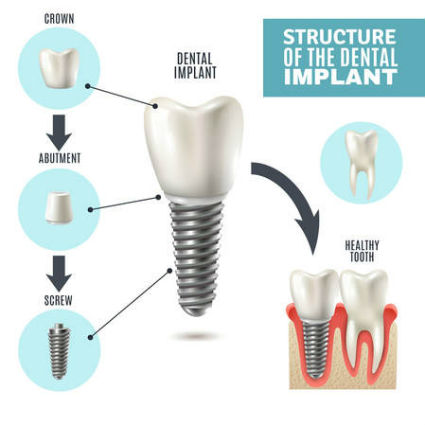Dental Implants
Dental implants have become a choice treatment option for many people who are missing one or more teeth. A dental implant is a replacement tooth “root” constructed of medical-grade titanium. Dental implants are extremely stable, strong and natural-lookinures.
Dental implants will allow you to once again speak and eat with comfort and confidence. They are secure and offer freedom from loose Dentures. They’ll allow you to say goodbye to worries about misplaced dentures and messy pastes and glues.
Dental implants help maintain the upper and lower jawbone preventing bone shrinkage and resorption, this can help reduce jowls, turkey neck, sunken cheeks, and other signs of ageing.
Usually, anyone healthy enough to undergo a tooth extraction is also a good candidate for a dental implant.
Dental implants have a very high success rate – 90%-95% over 10 years and are increasingly becoming the treatment of choice for dentists and patients.

Structure of Dental Implant
Types of Dental Implants:
There are many different types of implants depending on what we are planning to achieve with them.
- Replacing a single tooth; If you are missing a single tooth, one implant and crown can replace it. A dental implant replaces both the lost natural tooth and its root.
- Replacing several teeth; If you are missing several teeth, implant supported bridges can replace them. This will give your more functional units to chew on so you are not overloading your other teeth.
- Replacing all of your teeth; If you are missing all of your teeth, an implant-supported bridge or full denture can replace them. Implants also work well for people who are struggling with loose uncomfortable dentures.
Benefits of Dental Implants:
Dental implants are a conservative, fixed solution for replacing missing teeth, meaning they look and feel just like your natural tooth. Implants allow you to speak, eat and function normally and comfortably. The finished result is an extremely durable, aesthetic tooth which helps to prevent unwanted tooth movement or drifting of adjacent natural teeth. It can also help to evenly distribute the load when chewing, which may prevent wear of the adjacent teeth, helping to prevent future tooth loss. Dental implants, unlike conventional bridgework, don’t require any preparation of your adjacent teeth.
Dental Implants Procedure:
The procedure begins with a thorough examination which includes a series of scans to examine the bone structure present and surrounding anatomical structures. The ideal candidate for a dental implant is in good general and oral health. Depending on the quality and quantity of the remaining bone, additional procedures such as a bone graft or sinus lift may be advised.
Once planned, the surgical procedure is undertaken under local anaesthetic, where the dental implant fixture is placed into the jaw. This is left in the bone for approximately 3 months so the bone can grow and integrate around the implant. During this time, you may have a temporary denture or a small metal healing cap over the implant.
Once the dental implant is integrated/fused to the bone, impressions or scans are taken to fabricate the permanent crown specific to the implant.
After treatment, we will work closely with you to develop the best care plan. Periodic follow-up visits will be scheduled to monitor your implant, teeth and gums to make sure they are healthy.
Dental Implants FAQs
A dental implant is an artificial tooth root that is placed into jaw bone to hold a replacement tooth, bridge or denture. Dental implants may be an option for people who have lost a tooth or teeth due to decay, gum disease or injury.
Dental implants are a great way of replacing missing teeth as they are a direct tooth replacement. But they need to be maintained just like your other teeth to prevent inflammation or infection around the implant prosthesis.
No, the dental implant process consists of two parts. The first part is the surgical placement of the implant into the bone. Following three months, the second part follows with placement of the crown to the implant.
Generally, people find that dental implants are much more comfortable than dentures.
Yes, usually but not always. There are many reasons to maintain the space of a missing tooth. A significant space between teeth may affect how a person speaks or chews. Adjacent teeth have room to move and can shift. In some cases bone loss can occur around a missing tooth.
Dental implant surgery is one of the safest procedures in dentistry and it is the only restoration method that stimulates natural bone beneath the missing tooth.
Dental implant surgery is one of the safest procedures in dentistry and it is the only restoration method that stimulates natural bone beneath the missing tooth.




